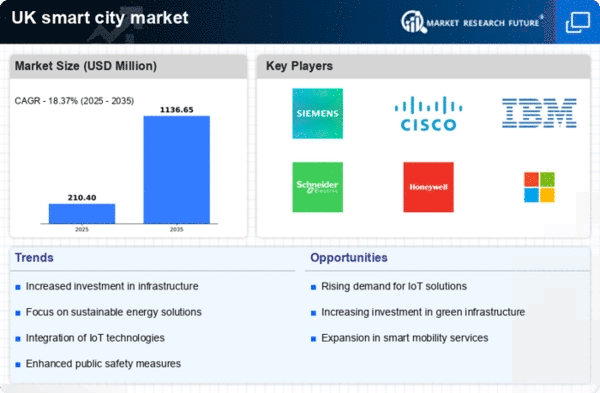Rising Urbanization Trends
Urbanization is a significant driver influencing the smart city market. The UK is experiencing a steady increase in urban population, with projections indicating that by 2030, approximately 90% of the population will reside in urban areas. This trend necessitates the development of smart city solutions to address challenges such as congestion, pollution, and resource management. The smart city market is poised to expand as cities seek innovative approaches to enhance livability and sustainability. Investments in smart infrastructure, such as public transport systems and energy-efficient buildings, are likely to rise in response to the demands of growing urban populations.
Increased Focus on Sustainability
Sustainability has emerged as a key driver for the smart city market. In the UK, there is a growing emphasis on reducing carbon emissions and promoting green technologies. The government has set ambitious targets to achieve net-zero emissions by 2050, which is likely to influence urban planning and development. The smart city market is expected to thrive as cities adopt sustainable practices, such as smart grids, renewable energy sources, and efficient waste management systems. This focus on sustainability not only addresses environmental concerns but also enhances the overall quality of life for residents, making cities more attractive for investment and habitation.
Technological Advancements in IoT
The integration of Internet of Things (IoT) technologies is a pivotal driver for the smart city market. In the UK, the proliferation of IoT devices is expected to enhance urban management and service delivery. By 2025, it is projected that the number of connected devices in urban areas could reach 1 billion, facilitating real-time data collection and analysis. This technological evolution enables cities to optimize resources, improve public safety, and enhance the quality of life for residents. The smart city market is likely to benefit from innovations in IoT, as they provide the backbone for smart infrastructure, including smart lighting, waste management, and traffic systems.
Enhanced Public Safety and Security
Public safety and security are paramount concerns for urban areas, driving the smart city market forward. In the UK, cities are increasingly adopting smart technologies to enhance safety measures, such as surveillance systems, emergency response solutions, and predictive policing. The smart city market is likely to see growth as municipalities invest in integrated security systems that utilize data analytics and real-time monitoring. By 2025, it is anticipated that the market for smart security solutions could reach £2 billion, reflecting the urgent need for cities to ensure the safety of their residents while fostering a sense of community trust and engagement.
Government Initiatives and Policies
Government initiatives play a crucial role in shaping the smart city market. The UK government has committed to investing £1.5 billion in smart city projects by 2025, aiming to foster innovation and sustainability. These initiatives often focus on enhancing urban mobility, energy efficiency, and public safety. The smart city market is likely to see accelerated growth as local authorities implement policies that encourage public-private partnerships and funding for smart technologies. Furthermore, regulatory frameworks are being established to support the deployment of smart solutions, which may lead to increased adoption and integration of advanced technologies in urban environments.















